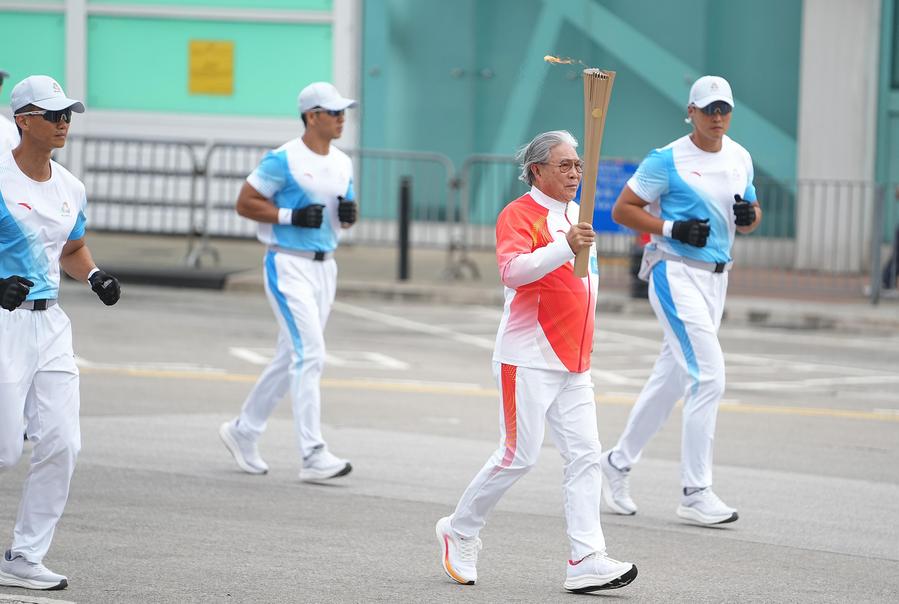
Focusing on curbing actions such as using AI technology to produce and publish fake videos, the Office of Central Cyberspace Affairs Commission (CAC) of China has launched a nationwide campaign to ensure a healthy online environment for the upcoming 15th National Games of China and the National Games for Persons with Disabilities (NGD).
The special campaign is part of China's long-run Qinglang Operation, also known as the "Clear and Bright" Operation, aimed at building a healthy online ecosystem. The current phase focuses on tackling six types of issues.
The operation aims at prohibiting individuals online from conducting any internet news information services related to the 15th National Games and the NGD without authorization. Additionally, with the impact of AI tools on cyber culture, the operation will specifically target those who employ AI technology to produce or disseminate fake videos of the event or spread misinformation about athletes, coaches, and referees.
Incidents involving the misuse of AI tools to spread false information have happened before. In a previous case, the voices of Chinese table tennis stars Sun Yingsha and Wang Chuqin were cloned using AI by a netizen and employed in online promotions for so-called organic eggs. Additionally, in August, female snooker player Wang Sinuo released a video statement revealing that she had been maliciously targeted by individuals who used AI synthesis technology to create pornographic videos featuring her image.
"The root cause of AI misuse lies in its easy accessibility and the low-cost means it provides to benefit from it, such as gaining attention and online views," said sport critic Luo Le, who has analyzed the impact of sports fandom on social culture. He also added that without stringent means like the operation and legal constraints, it "can be difficult to root out the negative impact of AI completely."
The current operation also aims to curb the dissemination of one-sided or distorted information about potential emergencies during the events, and to stop online voices from spreading distorted information about potential emergencies, posing as involved parties, or dredging up irrelevant past incidents.
To protect the event's formality and copyrights, the regulations prohibit the creation of websites, apps, mini-programs and more that imitate or replicate the Games' logos, name, its designs and so forth.
Meanwhile, the regulations also prohibit individuals from posting online comments that slander the country's One Country, Two Systems principle. On the internet, those that promote regional discrimination and maliciously undermine the reputation of the Games' joint host city venues such as the Hong Kong and Macao special administrative regions, and the cities of Guangzhou and Shenzhen will be banned.
The campaign will also crack down on violations of athlete privacy and reputation. Actions such as the intentional leakage of the personal information of athletes, coaches, and referees, as well as inciting online harassment, mutual online attacks, abuse, and other behavior will be targeted and rectified.
Amid the trend of fan culture converging with sporting events, incidents involving athlete privacy breaches, reputation damage, and even online bullying have also emerged. Recently in Shanghai, the local police investigated a case of online harassment targeting a Chinese diver. The investigation revealed that one suspect used a short-video platform account to spread false information about the athlete being banned from competitions, while another suspect persistently used multiple platform accounts to post videos insulting and defaming the diver, along with repeatedly using abusive language.
Such cases reveal the drawbacks of fervent fandom such as "an absence of ethics," Luo told the Global Times. Prior to the current operation, deployed by the Ministry of Public Security, another nationwide operation was also rolled out in June. This one aims to crack down on severe offenses such as public insults and online violence facilitated through internet platforms.
"These operations serve as a powerful deterrent in the field of cybersecurity. By making examples of violators by publicizing typical cases, they deliver a clear warning to those who might think about undermining the order of cyberspace," Luo told the Global Times.
The current campaign seeks to ensure a secure online environment not only for the 15th National Games but also for the NGD, which is scheduled from December 8 to 15.
Photo | Xinhua






